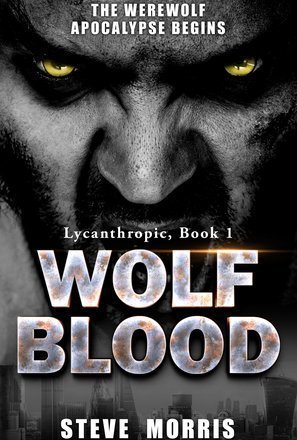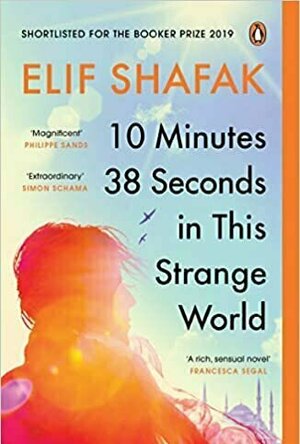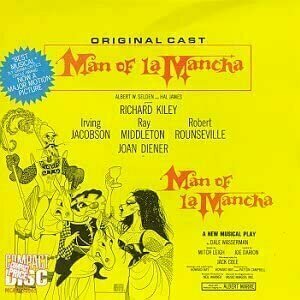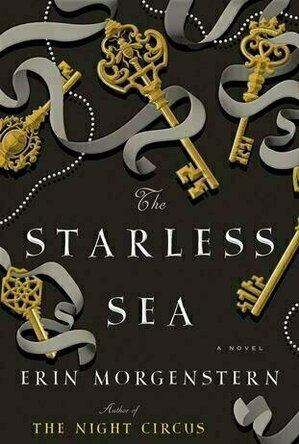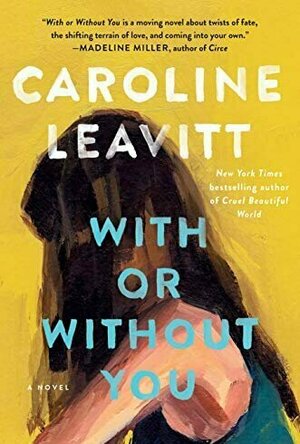Search
Search results
Acanthea Grimscythe (300 KP) rated Wolf Blood in Books
Jan 31, 2019
Wolf Blood is a fresh, new take on the apocalypse–free of zombies and nuclear fallout. It’s a welcome breath of fresh air in a market that’s already overly saturated with the same tropes, and for that Steve Morris deserves props. That’s not to say that there aren’t issues with Wolf Blood. There are several, actually. It does, however, mean that this is a title worth taking the time to read if you’re sick of the same washed up material.
Professor Wiseman and his three students, Samuel, Leann, and Adam, have tucked themselves away in the Carpathians after a poorly received publication foretelling of a werewolf apocalypse is met with widespread mockery and criticism. His reputation ruined, the Professor and his students continue their research in quiet solitude–until things go wrong. All three students become infected, soon returning to London to bring back the superiority of wolves.
Let’s be honest, this idea is pretty interesting and in execution, Morris does a pretty decent job. I didn’t find any outwardly obvious plot holes, and that’s a plus too. The book is fast-paced, making for an easy and quick read. It isn’t bogged down with too much exposition, either. In fact, it might not have enough in some cases. Fortunately, it doesn’t detract too much from what’s going on.
Also, characters. There are too many characters whose purpose isn’t revealed in this book. Granted it’s the first of a series and they probably have a reason to exist later on down the road, but ultimately I feel it would have been better if those characters were introduced later. Instead we end up with a handful of people we don’t care about, and not enough time to develop feelings for those we do meet.
Morris’s werewolves are an important topic of discussion too. They are somewhere in-between the romanticized version and the truly monstrous. As a fan of gore and horror, I was hoping for purely the latter–especially since it is an apocalypse book. While there is some sappiness to this crew of mangy mutts, much of their desires lean toward the more primal nature of a wolf.
Overall, I thoroughly enjoyed reading this; I devoured it in just over twenty-four hours and, considering all that’s going on in my life, that’s a good thing. Rating wise, I’m stuck between three and four. Considering how much fun I had reading it, I’ve decided to lean toward the higher rating. This is definitely a fun book.
I would like to thank the publisher and NetGalley for providing me with a free copy of this book in exchange for an honest and unbiased review.
Professor Wiseman and his three students, Samuel, Leann, and Adam, have tucked themselves away in the Carpathians after a poorly received publication foretelling of a werewolf apocalypse is met with widespread mockery and criticism. His reputation ruined, the Professor and his students continue their research in quiet solitude–until things go wrong. All three students become infected, soon returning to London to bring back the superiority of wolves.
Let’s be honest, this idea is pretty interesting and in execution, Morris does a pretty decent job. I didn’t find any outwardly obvious plot holes, and that’s a plus too. The book is fast-paced, making for an easy and quick read. It isn’t bogged down with too much exposition, either. In fact, it might not have enough in some cases. Fortunately, it doesn’t detract too much from what’s going on.
Also, characters. There are too many characters whose purpose isn’t revealed in this book. Granted it’s the first of a series and they probably have a reason to exist later on down the road, but ultimately I feel it would have been better if those characters were introduced later. Instead we end up with a handful of people we don’t care about, and not enough time to develop feelings for those we do meet.
Morris’s werewolves are an important topic of discussion too. They are somewhere in-between the romanticized version and the truly monstrous. As a fan of gore and horror, I was hoping for purely the latter–especially since it is an apocalypse book. While there is some sappiness to this crew of mangy mutts, much of their desires lean toward the more primal nature of a wolf.
Overall, I thoroughly enjoyed reading this; I devoured it in just over twenty-four hours and, considering all that’s going on in my life, that’s a good thing. Rating wise, I’m stuck between three and four. Considering how much fun I had reading it, I’ve decided to lean toward the higher rating. This is definitely a fun book.
I would like to thank the publisher and NetGalley for providing me with a free copy of this book in exchange for an honest and unbiased review.
Gareth von Kallenbach (980 KP) rated Ocean’s 8 (2018) in Movies
Jul 8, 2019
For the last five plus years all Debbie Ocean (Sandra Bullock) has had to think about was how to steal a $150 million dollar necklace of the neck of a mark during the Met Gala. Why she had all that time to think about was because she was incarcerated. The plan is flawless on paper but it would have to be to pull off this caper at one of the most high profile events of the year. Meticulously thought out and every eventuality covered. Now all she needs is a crew to make it happen. She gets her right hand girl Lou (Cate Blanchett) and they set out to plan the heist. The start with getting down on her luck designer Rose Weil (Helena Bonham Carter), who must persuade the mark, socialite actress Daphne Kluger (Anne Hathaway), to wear her dress and the diamonds to the even. Then let add a fence, Tammy (Sarah Paulson), a pick-pocket, Constance (Awkwafina), diamond expert, Amita (Mindy Kaling), and a hacker, Nine Ball (Rihanna), everyone they need to make this plan happen. The plan is made, the crew is assembled and the Met Ball is days away and all they have to do is rob a highly protected necklace in a museum filled with people and more cameras than you can count.
David Ross (Pleasantville, Seabiscuit) wrote and directed the most recent film in the Ocean’s storyline. It definitely is in the same mold of the male dominated Ocean’s trilogy of films. There are even cameos from the old crew and the direct link of the main character being the sister of the protagonist of those films really ties them together. There are several nods to the original films and even the music and cinematography match up pretty well. At times I would say that it tries too hard to be like those films.
The cast does a great job. The character development is really good and if successful could definitely lead to follow up films. Awkwafina, who I had not heard of before going into this film, was a real bright spot and stood out in the scenes she was in. James Corden, as insurance investigator John Frazier, was also fun. The flow and pace of the film really went along well. There were definitely fun moments, also some moments that were a little cheesy, which are to be expected. Also to be expected in heist movie are some twist and turns, which this film delivers on. It keeps you guessing until the end.
Overall this was a fun movie going experience but maybe on I would be more likely to rent than see on the big screen.
David Ross (Pleasantville, Seabiscuit) wrote and directed the most recent film in the Ocean’s storyline. It definitely is in the same mold of the male dominated Ocean’s trilogy of films. There are even cameos from the old crew and the direct link of the main character being the sister of the protagonist of those films really ties them together. There are several nods to the original films and even the music and cinematography match up pretty well. At times I would say that it tries too hard to be like those films.
The cast does a great job. The character development is really good and if successful could definitely lead to follow up films. Awkwafina, who I had not heard of before going into this film, was a real bright spot and stood out in the scenes she was in. James Corden, as insurance investigator John Frazier, was also fun. The flow and pace of the film really went along well. There were definitely fun moments, also some moments that were a little cheesy, which are to be expected. Also to be expected in heist movie are some twist and turns, which this film delivers on. It keeps you guessing until the end.
Overall this was a fun movie going experience but maybe on I would be more likely to rent than see on the big screen.
Sophia (Bookwyrming Thoughts) (530 KP) rated The Heartbeat Thief in Books
Jan 23, 2020
<b><i>I received this book for free from Xpresso Book Tours in exchange for an honest review. This does not affect my opinion of the book or the content of my review.</i></b>
Strangely enough, I enjoyed <i>The Heartbeat Thief</i>. Senza is the most perfect character I've ever met she's flawless, admired, wealthy, loved, intelligent. She knows it, but she doesn't want to flaunt it, which is what I really liked about Senza as a character. She hates going to parties and balls, and she dreads getting married off to a man that she doesn't want. I think I have a thing for characters who have an inner rebel in them.
Senza seems to have a perfect life until her grandmother dies. After that, she seems lost and obviously wants to carve her own path in life instead of letting her mother take the reins from her. Her discovery of eternal life is almost like a deal with a devil. She has to sacrifice her life to become immortal and keep her looks forever, but she has to carefully steal the heartbeats of another if she wants to keep her immortality. If she's not careful, those around her would be able to find out about her and accuse of witchcraft or something equally sinister.
<blockquote>Your spell must be fed, one heartbeat at a time. You must learn to steal them from the living. One here, one there. A person will not notice a skipped beat, and they must never know it is you who is making them skip. And you must do it, or the spell will fade and die.</blockquote>
Krafton's latest novel is a book I'm just interested in how the story will play out. Senza doesn't really come across as a selfish person in general until she decides to play with the strings of fate. As time goes by, she has to disguise herself from those around her so they don't find out what she did. Senza goes from place to place and she meets all kinds of people from all walks of life throughout the book. There's not exactly a clear plot going on here, and I almost expected a tragic ending where karma decided to finally bite back at Senza.
<i>The Heartbeat Thief</i> is a book with a unique storyline where one eventually realizes just what kind of price is really paid when death is defied. It's nicely done for a book where there's a character who doesn't have any flaws whatsoever.
<a href="https://bookwyrmingthoughts.com/review-the-heartbeat-thief-by-aj-krafton/"; target="_blank">This review was originally posted on Bookwyrming Thoughts</a>
Strangely enough, I enjoyed <i>The Heartbeat Thief</i>. Senza is the most perfect character I've ever met she's flawless, admired, wealthy, loved, intelligent. She knows it, but she doesn't want to flaunt it, which is what I really liked about Senza as a character. She hates going to parties and balls, and she dreads getting married off to a man that she doesn't want. I think I have a thing for characters who have an inner rebel in them.
Senza seems to have a perfect life until her grandmother dies. After that, she seems lost and obviously wants to carve her own path in life instead of letting her mother take the reins from her. Her discovery of eternal life is almost like a deal with a devil. She has to sacrifice her life to become immortal and keep her looks forever, but she has to carefully steal the heartbeats of another if she wants to keep her immortality. If she's not careful, those around her would be able to find out about her and accuse of witchcraft or something equally sinister.
<blockquote>Your spell must be fed, one heartbeat at a time. You must learn to steal them from the living. One here, one there. A person will not notice a skipped beat, and they must never know it is you who is making them skip. And you must do it, or the spell will fade and die.</blockquote>
Krafton's latest novel is a book I'm just interested in how the story will play out. Senza doesn't really come across as a selfish person in general until she decides to play with the strings of fate. As time goes by, she has to disguise herself from those around her so they don't find out what she did. Senza goes from place to place and she meets all kinds of people from all walks of life throughout the book. There's not exactly a clear plot going on here, and I almost expected a tragic ending where karma decided to finally bite back at Senza.
<i>The Heartbeat Thief</i> is a book with a unique storyline where one eventually realizes just what kind of price is really paid when death is defied. It's nicely done for a book where there's a character who doesn't have any flaws whatsoever.
<a href="https://bookwyrmingthoughts.com/review-the-heartbeat-thief-by-aj-krafton/"; target="_blank">This review was originally posted on Bookwyrming Thoughts</a>
Sophia (Bookwyrming Thoughts) (530 KP) rated Gambit (The Prodigy Chronicles, #1) in Books
Jan 23, 2020
<b><i>I received this book for free from Publisher in exchange for an honest review. This does not affect my opinion of the book or the content of my review.</i></b>
<i>Gambit </i>is one of those books that are slow, but the slow feel of the book fits with the plot decently. Willow Kent, the main character, lives in a world where people with extraordinary powers live good lives in the Core (analogize it to the Capitol in the Hunger Games, if you will) and those without live in poverty. She doesn't really know much about her childhood aside from the fact she got left with a family and adopted by them at a really young age, and it remains that way until a Core officer discovers she is really a lost heiress and strives to bring her back to her original family.
Nearly half the book is located in a small village where Willow grows up in trading items is a thing, messengers traveling from the Core and back exist, and it's basically back to the old fashioned world where wearing a swimming suit is bad for ladies (because <em>perverts</em>). The characters in the villages have the <em>weirdest</em> character names I've ever seen, like Patchie and Temsik Temsik doesn't bother me as much as Patchie does. As for the Core... I'm not too sure about that one yet.
Every once in a while a name I've heard of actually pops up, like Willow, for instance. Willow has a fire in her that I like for some reason she's fierce, stubborn, and there's definitely some humor in her snark, especially towards Commander Reece (she's like a ball trying to bounce at the wall that won't budge).
The other half of the book is dedicated to a small portion of the Core where Willow was <em>supposed</em> to have grown up in. Although it's only one particular area and then some more, Denault gives enough information that gives a good idea on what the rest of the Core is really like. Blinds don't exist and it's the coolest technology ever. I personally think Willow will do perfectly fine harnessing the reins of the Core from the way she negotiates.
The first of the Prodigy Chronicles is a slow first book as Willow transitions from village life to Core life, but Denault is fantastic at not boring the readers with her writing <i>Gambit </i>has a lightheartedness to it that I really enjoyed and it seems to promise of better things and more action further in the sequels.
<a href="https://bookwyrmingthoughts.com/review-gambit-by-cl-denault/"; target="_blank">This review was originally posted on Bookwyrming Thoughts</a>
<i>Gambit </i>is one of those books that are slow, but the slow feel of the book fits with the plot decently. Willow Kent, the main character, lives in a world where people with extraordinary powers live good lives in the Core (analogize it to the Capitol in the Hunger Games, if you will) and those without live in poverty. She doesn't really know much about her childhood aside from the fact she got left with a family and adopted by them at a really young age, and it remains that way until a Core officer discovers she is really a lost heiress and strives to bring her back to her original family.
Nearly half the book is located in a small village where Willow grows up in trading items is a thing, messengers traveling from the Core and back exist, and it's basically back to the old fashioned world where wearing a swimming suit is bad for ladies (because <em>perverts</em>). The characters in the villages have the <em>weirdest</em> character names I've ever seen, like Patchie and Temsik Temsik doesn't bother me as much as Patchie does. As for the Core... I'm not too sure about that one yet.
Every once in a while a name I've heard of actually pops up, like Willow, for instance. Willow has a fire in her that I like for some reason she's fierce, stubborn, and there's definitely some humor in her snark, especially towards Commander Reece (she's like a ball trying to bounce at the wall that won't budge).
The other half of the book is dedicated to a small portion of the Core where Willow was <em>supposed</em> to have grown up in. Although it's only one particular area and then some more, Denault gives enough information that gives a good idea on what the rest of the Core is really like. Blinds don't exist and it's the coolest technology ever. I personally think Willow will do perfectly fine harnessing the reins of the Core from the way she negotiates.
The first of the Prodigy Chronicles is a slow first book as Willow transitions from village life to Core life, but Denault is fantastic at not boring the readers with her writing <i>Gambit </i>has a lightheartedness to it that I really enjoyed and it seems to promise of better things and more action further in the sequels.
<a href="https://bookwyrmingthoughts.com/review-gambit-by-cl-denault/"; target="_blank">This review was originally posted on Bookwyrming Thoughts</a>

The Photoshop Elements 14 Book for Digital Photographers
Book
ARE YOU READY FOR AN ELEMENTS BOOK THAT BREAKS ALL THE RULES? This book breaks new ground by doing...
Holly Johnson recommended Sgt. Pepper's Lonely Hearts Club Band by The Beatles in Music (curated)
Melanie Caldicott (6 KP) rated 10 Minutes 38 Seconds in This Strange World in Books
Apr 29, 2021
You can also read my review at my blog - https://roamingthroughbooks.wordpress.com
I saw this book reviewed on The Sky Arts Book Club and Shafak was interviewed and I think I fell a little in love. Shafak is a beautiful human being who is currently self-exiled from Turkey to the content of her novels being subject to investigation as part of a legal movement in which writers are frequently prosecuted. A passionate storyteller, who writes openly about human rights, her protagonists are often the fallen, forgotten and marginalised. Needless to say I have been looking forward to reading this ever since.
10 Minutes 38 Seconds in this Strange World is a novel about a murdered street walker, Tequila Leila and the last moments of brain activity that is said to occur after the heart has stopped beating. The memories of her life flood back, often related to taste and smell and we start to learn about the story of her life.
Central to her memories and providing a backbone to her life were The Five, – five people with which she formed close, integral friendships and in the absence of her blood relatives, are Leila’s “family”.
The book is structured around three parts – the first, The Mind telling the stories of her post-mortem memories, the second, The Body about how she was murdered and the impact it has on The Five, and finally, The Soul which is a touching finale in which The Five determine to give Leila the send-off she deserves.
Shafak is such a clever storyteller and is able to illuminate aspects of humanity which is often avoided or ignored, which make us feel uncomfortable, and yet her tenderness and compassion shine through the portrayal of all her characters enabling the reader to walk a mile in the shoes of those who are often forgotten.
For a book centred around death, an issue that rarely sits comfortably with human beings, 10 Minutes 38 Seconds in this Strange World confronts it without fear. She skilfully takes a sex worker’s body which is disregarded in its anonymity by those that are responsible for sweeping up the detritus of the Istanbul streets, and reveals a story of a life, full of tragedy, joy and love.
I love how Elif Shafak takes the stories of all of The Five and transforms the insignificant to the significant through the love they have for Leila and each other. In a society which elevates the rich and famous and makes their voices the loudest and most significant in the world, I loved the truth which was affirmed in this book about what a life of substance really means.
I saw this book reviewed on The Sky Arts Book Club and Shafak was interviewed and I think I fell a little in love. Shafak is a beautiful human being who is currently self-exiled from Turkey to the content of her novels being subject to investigation as part of a legal movement in which writers are frequently prosecuted. A passionate storyteller, who writes openly about human rights, her protagonists are often the fallen, forgotten and marginalised. Needless to say I have been looking forward to reading this ever since.
10 Minutes 38 Seconds in this Strange World is a novel about a murdered street walker, Tequila Leila and the last moments of brain activity that is said to occur after the heart has stopped beating. The memories of her life flood back, often related to taste and smell and we start to learn about the story of her life.
Central to her memories and providing a backbone to her life were The Five, – five people with which she formed close, integral friendships and in the absence of her blood relatives, are Leila’s “family”.
The book is structured around three parts – the first, The Mind telling the stories of her post-mortem memories, the second, The Body about how she was murdered and the impact it has on The Five, and finally, The Soul which is a touching finale in which The Five determine to give Leila the send-off she deserves.
Shafak is such a clever storyteller and is able to illuminate aspects of humanity which is often avoided or ignored, which make us feel uncomfortable, and yet her tenderness and compassion shine through the portrayal of all her characters enabling the reader to walk a mile in the shoes of those who are often forgotten.
For a book centred around death, an issue that rarely sits comfortably with human beings, 10 Minutes 38 Seconds in this Strange World confronts it without fear. She skilfully takes a sex worker’s body which is disregarded in its anonymity by those that are responsible for sweeping up the detritus of the Istanbul streets, and reveals a story of a life, full of tragedy, joy and love.
I love how Elif Shafak takes the stories of all of The Five and transforms the insignificant to the significant through the love they have for Leila and each other. In a society which elevates the rich and famous and makes their voices the loudest and most significant in the world, I loved the truth which was affirmed in this book about what a life of substance really means.
Gordon Gano recommended track Dulcinea by Various Artists in Man of La Mancha by Various Artists in Music (curated)
BookInspector (124 KP) rated The Starless Sea in Books
Sep 24, 2020 (Updated Jan 26, 2021)
The protagonist of this book is Zachary, a university student, who finds a strange book in the library, which leads him to an underground world full of stories. I really liked Zachary, he is intelligent, nerdy and adventurous, and I really liked him as a protagonist of this story. All the characters in this book were mesmerizing, mystical and magical. The world that the author created was something unbelievably beautiful and surreal. 🙂 I really liked the relationships between the characters, it was interesting to watch their interactions. Another thing that I found great is the diversity of the characters, and I liked that the protagonist was gay. 🙂
The narrative of this book is what left me confused. The narrative is a mess of million stories. It is a story upon a story about a different story that is somehow connected with another story from a different story, and it should make absolute sense. For me sometimes it did and sometimes I had no clue what in a world is going on. 😀 There is so much information in this book, so many different stories that it was hard to grasp it all. This book raised many many questions in my head, and I do not have the answers to them. The book is pretty philosophical, but I liked the balance between the actual adventure that Zachary was on, and all those thoughts about time, space, existence etc.
I simply can not describe the writing style of this book. The author is truly gifted to deliver something like this. I can’t imagine what has been going on in her mind to write something like this. As I mentioned before, to create such a world, where all those stories mentioned in the book makes sense in one way or another, it is just WOW! The chapters have a decent length, and together with constant changes between different stories, this book did not leave me bored. The ending of this book was pretty weird to me, but I liked how this book finished.
So, to conclude, it is hard to describe this novel. It is a very strange book, that is filled to the brim with characters that are incredibly well-crafted and the plot that is truly something special. However, it was way too much stuff going on for my liking. I really would love to see a film based on this book, I think it would be quite amazing to see this world coming to life. 🙂 I think everyone should give this book a go, I can see why people love it so much. But I will remain on the less enthusiastic side for now.
The narrative of this book is what left me confused. The narrative is a mess of million stories. It is a story upon a story about a different story that is somehow connected with another story from a different story, and it should make absolute sense. For me sometimes it did and sometimes I had no clue what in a world is going on. 😀 There is so much information in this book, so many different stories that it was hard to grasp it all. This book raised many many questions in my head, and I do not have the answers to them. The book is pretty philosophical, but I liked the balance between the actual adventure that Zachary was on, and all those thoughts about time, space, existence etc.
I simply can not describe the writing style of this book. The author is truly gifted to deliver something like this. I can’t imagine what has been going on in her mind to write something like this. As I mentioned before, to create such a world, where all those stories mentioned in the book makes sense in one way or another, it is just WOW! The chapters have a decent length, and together with constant changes between different stories, this book did not leave me bored. The ending of this book was pretty weird to me, but I liked how this book finished.
So, to conclude, it is hard to describe this novel. It is a very strange book, that is filled to the brim with characters that are incredibly well-crafted and the plot that is truly something special. However, it was way too much stuff going on for my liking. I really would love to see a film based on this book, I think it would be quite amazing to see this world coming to life. 🙂 I think everyone should give this book a go, I can see why people love it so much. But I will remain on the less enthusiastic side for now.
Kristy H (1252 KP) rated With or Without You in Books
Sep 17, 2020
Stella and Simon have been together nearly twenty years. Simon, a rock musician, has spent most of those waiting for his one big break. He thinks he's found it now, but right before he and Stella are set to leave for California for the show that could change his life, she falls into a coma. Now Simon faces a choice: get on the plane with his band, or remain behind with his love. As for Stella, she's aware of the world around her while in the coma, and when she emerges, she's different, with a newfound artistic talent. Together, Simon and Stella must reexamine their relationship and figure out the path forward.
What a beautiful and striking novel. I discovered Caroline Leavitt through the power of ARCs in 2016, falling in love with her work through Cruel Beautiful World. She gives us another book filled with compelling characters here. I so enjoyed reading a book with a different plot, especially knowing that the coma story was somewhat based on Leavitt's own life. She's a remarkable writer in so many ways.
With or Without You is incredibly well-written--almost poetic at times. It's told from both Simon and Stella's perspectives, including while Stella's in her coma, and some of those moments are quite profound and touching. Both Stella's realizations as she struggles to realize where she is, and Simon's, as he tries to grapple with the idea of his partner being ill, as well as the awareness that he may be losing his last chance at fame and fortune as his band moves on without him.
"It's a kind of blankness. She's been erased for a while and then redrawn. When she comes back, she always feels a little bit better..."
Even worse for both Simon and Stella is the fact that they fought shortly before she fell into the coma. What kind of relationship, each wonders, would they come back into should Stella awake? In this way, Leavitt gives a beautiful character study: an in-depth observation into a flawed relationship. It just happens to be a relationship where a woman enters and exits a coma. It's an amazing look into love, loyalty, and loss. The novel makes you think, drawing you into the characters. What would you do in Simon's situation, you think? Or Stella's?
"Mostly she thought of all the things that she herself wanted, and like Simon's dreams, they had an expiration date she couldn't ignore."
Overall, I quite enjoyed this novel. It's so well-done and such a different and intriguing look at two people trying to find happiness. I love Leavitt's way with words. 4 stars.
What a beautiful and striking novel. I discovered Caroline Leavitt through the power of ARCs in 2016, falling in love with her work through Cruel Beautiful World. She gives us another book filled with compelling characters here. I so enjoyed reading a book with a different plot, especially knowing that the coma story was somewhat based on Leavitt's own life. She's a remarkable writer in so many ways.
With or Without You is incredibly well-written--almost poetic at times. It's told from both Simon and Stella's perspectives, including while Stella's in her coma, and some of those moments are quite profound and touching. Both Stella's realizations as she struggles to realize where she is, and Simon's, as he tries to grapple with the idea of his partner being ill, as well as the awareness that he may be losing his last chance at fame and fortune as his band moves on without him.
"It's a kind of blankness. She's been erased for a while and then redrawn. When she comes back, she always feels a little bit better..."
Even worse for both Simon and Stella is the fact that they fought shortly before she fell into the coma. What kind of relationship, each wonders, would they come back into should Stella awake? In this way, Leavitt gives a beautiful character study: an in-depth observation into a flawed relationship. It just happens to be a relationship where a woman enters and exits a coma. It's an amazing look into love, loyalty, and loss. The novel makes you think, drawing you into the characters. What would you do in Simon's situation, you think? Or Stella's?
"Mostly she thought of all the things that she herself wanted, and like Simon's dreams, they had an expiration date she couldn't ignore."
Overall, I quite enjoyed this novel. It's so well-done and such a different and intriguing look at two people trying to find happiness. I love Leavitt's way with words. 4 stars.
